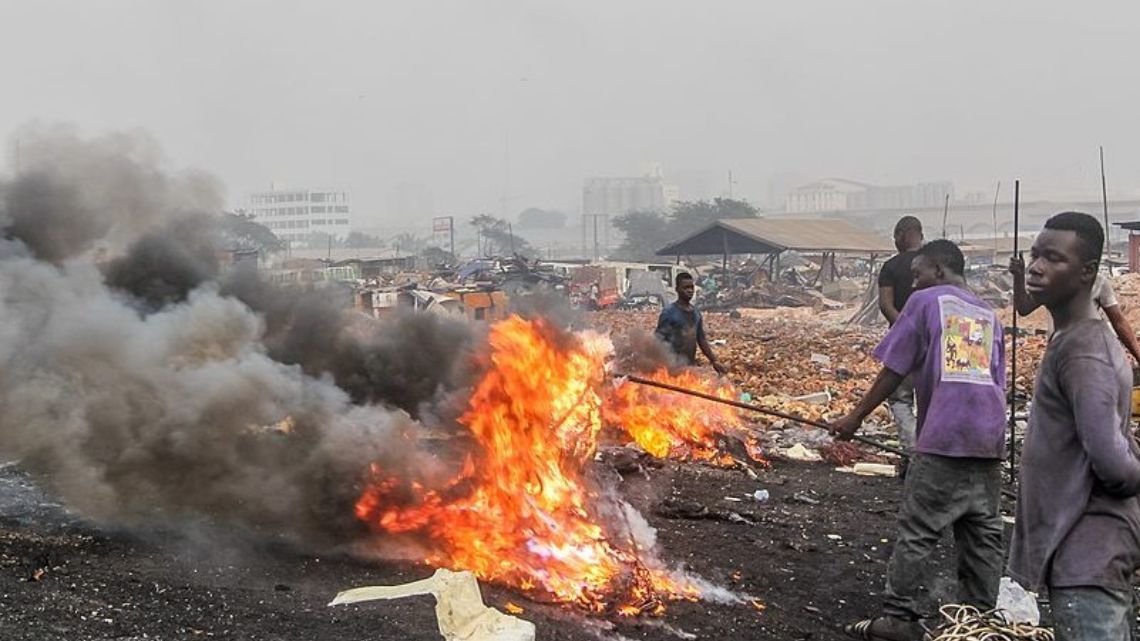Madina Zongo Junction, Agbogbloshie, Makola, Tudu, Oxford Street, Lapaz, and Kaneshie Market are the communities in Accra with the highest levels of air pollution.
This alarming data comes from the monitoring network of the Breathe Accra Project and was discussed during a recent roundtable at the SunLodge Hotel in Tesano, Accra.
The discussion, part of the maiden Air Quality Awareness Week organized by the Ghana Urban Air Quality Project, focused on policy interventions to address the growing air pollution problem in Accra and other metropolitan areas of Ghana.
The communique issued after the roundtable outlined several measures for the government and other stakeholders to tackle air pollution effectively. Here are the sector-specific recommendations from the experts:
Waste Management Sector
Open burning of waste is a major source of air pollution in Ghanaian cities due to limited and irregular waste collection services. The following recommendations were made to curb this practice:
- Adopt Circular Economy: The government should adopt a model that involves sharing, leasing, reusing, repairing, refurbishing, and recycling existing materials and products for as long as possible.
- Regulate ‘Aboboyaa’ Operators: Assemblies should engage operators of tricycle waste collectors to form cooperatives for better regulation and streamlining of their activities.
- Promote Waste Segregation: Encourage the separation of waste to enable the recycling of plastics, metals, and composting of organic waste.
- Performance-Based Contracts: Assemblies should ensure waste collection contracts are performance-based, with annual evaluations by households and termination of non-performing companies.
- Punitive Measures: Consider punitive measures for individuals and households engaging in open burning of waste.
- Strategic Waste Transfer Stations: Ensure strategic placement of waste transfer stations and secure appropriate waste disposal sites.
- Link Waste Collection to Property Rates: Integrate waste collection services with property rate payments.
- Streamline E-Waste Operations: Regulate e-waste sector operations to stop open burning.
Transport Sector
Vehicular emissions significantly contribute to air pollution in Ghanaian cities due to the growing number of vehicles, many of which do not meet emission standards. Recommendations to curb vehicular emissions include:
- Enforce Vehicle Emission Standards: Expedite the use of vehicle testing results by the DVLA and EPA to enforce emission standards.
- Improve Public Transport: Increase and maintain clean public transport vehicles running on scheduled timetables to encourage car owners to use public transport.
- Introduce Electric Buses: Replace intra-city fleets with electric buses.
- Promote Active Travel: Incorporate walking and cycling lanes in road infrastructure projects.
- Expand Traffic Management Centre: Cover all major traffic intersections and integrate them with actuated signal systems to reduce congestion and emissions from idling vehicles.
- Consider Bicycle Share System: Promote park-and-ride bicycle systems.
- Sensitize on Vehicle Maintenance: GRPRTU and PROTOA should educate vehicle owners on maintenance practices.
- Introduce Remote Working: Encourage corporate organizations to implement remote working to reduce city travel.
- Support New Vehicle Acquisition: Invest in private transport operations through vehicle leasing or hire purchase schemes to replace old, polluting vehicles.
- Encourage Local Manufacturing: Provide a conducive environment for local vehicle manufacturing and assembly at competitive prices.
- Reduce Dust Pollution: Water roads under construction regularly to prevent dust pollution.
- Set Speed Limits on Untarred Roads: Reduce speed limits to prevent dust pollution in residential neighborhoods.
Household Energy Sector
The use of biomass fuels for cooking generates high levels of Household Air Pollution (HAP) and contributes to ambient air pollution. Recommendations to reduce HAP include:
- Support LPG Use: Sustain the National Petroleum Authority’s Cylinder Recirculation Model to improve LPG supply and access.
- Remove LPG Taxes: Consider removing taxes on LPG to make it affordable for low-income households.
- Promote Improved Cook Stoves: Encourage the use of low-emitting biomass fuels like briquettes.
- Engage CBOs and NGOs: Sensitize households on clean cooking solutions and provide tax incentives for briquette producers to make their products affordable locally.
Industrial Sector
Industrial emissions are a major source of air pollution due to obsolete technologies and unregulated industries. Recommendations to curb industrial emissions include:
- Regulate Factories: Ensure factories, especially those in residential areas, adhere to emission standards.
- Enforce Prohibition Notices: Prevent factories from operating if they fail to meet emission standards.
- Focus on Health and Safety: Prioritize air pollution issues in health and safety policies for workers.
- Prohibit Vehicle Spraying in Residential Areas: Vehicle spraying should only be done in designated areas with appropriate equipment.
- Minimize Dust Pollution at Construction Sites: Regulate activities to control dust pollution.
Markets
Market centers are hotspots for air pollution due to various activities. Recommendations to reduce pollution include:
- Prohibit Fires in Markets: Implement byelaws to ban setting fires at market centers.
- Promote Clean Cooking: Encourage the use of LPG and improved cook stoves among market vendors.
- Encourage Electric Milling Machines: Prohibit gasoline-powered milling machines in favor of electric-powered ones.
- Advise Against Vehicle Idling: Display posters in market centers advising drivers to avoid idling their vehicles.
These comprehensive measures, if implemented, can significantly improve air quality in Accra and other parts of Ghana, addressing the urgent need for action against air pollution.


